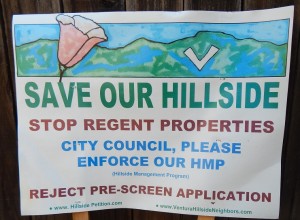
Regent Properties took a giant step forward towards the eventual development of 55 homes in the hillsides above Ventura. On Nov. 30, the Ventura City Council approved the prescreen application submitted by the developer and previously approved by the Planning Commission.
At the special council meeting, which lasted more than 8 hours, the council voted 4-1 to allow the developer to move forward in what will be a very long and very expensive application process to build the luxury houses. Regent has named the development the La Viera Project.
Contrary to what some of those opposed believe, the City Council did not approve the specific drawings presented by Regent but just the concept of this development.
To start the meeting, Community Development Director Jeff Lambert very carefully explained what the prescreen process was and what its approval would mean. He stated, “It is allowing the developer to file a formal application.”
As also explained by Councilmember Carl Morehouse, he said this is not the approval of a project but just a concept, a process, a beginning.
Only 5 council members were allowed to vote because members Tracy and Weir were asked to recuse themselves from participating because of where they currently live. Mayor Cheryl Heitmann, Deputy Mayor Erik Nasarenko, Neil Andrews and Carl Morehouse voted yes and Jim Monahan voted no to proceed with the prescreen.
This will allow Regent, and the City to have CEQA-EIR reports and many other reports, studies and documentation created that will need review and approval by the planning department, design review and City Council before this project is ever approved. This process could take another 3-4 years. There will still be many opportunities for both those opposing and supporting the project to be heard.
In approving the prescreen, the council members made it quite clear that they had many concerns about the final plans for the project and that they were just approving the very general concept of the proposed development.
Member Eric Nasarenko said, “What I lack is impartial, third-party data. This is the process, this is the vehicle by which we collect that information.”
Based upon his concerns, and to take the public’s comments into consideration, he made a second motion to include a list for Regent to consider in preparing their next stage of drawings. Other council members and planning staff added to the list which was approved 5-0 by the council.
Items included in that list were:
Minimize grading and artificial creation of steep slopes through low terracing and retaining walls and varied lot and pad sizes.
Allow roads to exceed 15% grade in short stretches if it improves the overall design.
Allow development within areas of over 30% slope as long as it results in better overall design & is instituted only when necessary.
Daniel Gryczman, President of the Regent Land division, told the council the proposal would be good for Ventura. He said the “state-of-the-art” development would create $164 million in economic output for the city and that “the project over many years will create millions of dollars of new money in the general fund.”
Regent is not expected to submit a formal application until 2017.
Although she didn’t vote, member Christy Weir told the Breeze, “Ventura will benefit in many ways from the addition of executive housing — increased tax base, high-income homeowners who support our local businesses and non-profits, and the availability of homes for business owners who would otherwise locate in other areas. Every city needs a healthy balance of homes to provide a “full-service” community. We don’t want our lower-wage workforce or our highest-income individuals to have to commute. “
“We have two under-construction hospital facilities that are in the process of hiring many new physicians. The majority of these health professionals are purchasing homes in surrounding communities because of Ventura’s small supply of executive housing. As we consider where high-end homes could be located, the lower hillsides within the city limits are one option. However, stringent levels of review, including attention to public input, are essential to ensure safety, neighborhood compatibility, environmental sensitivity, aesthetics and community benefit.”
